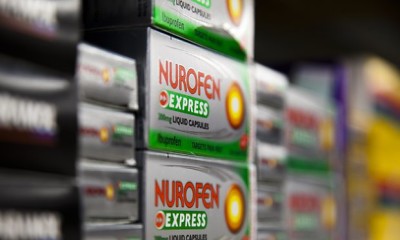
Nurofen’s manufacturer Reckitt Benckiser should be fined $6m for misleading consumers over a range of “targeted” pain products that cost twice as much as its standard painkillers despite having the same active ingredient and effect, the Australian Competition and Consumer Commission (ACCC) has found.
In December the federal court found the British company Reckitt Benckiser, the manufacturer of the painkiller, had engaged in “misleading conduct” by representing that its Nurofen Specific Pain products targeted a type or area of pain despite being identical, and ordered they be removed from supermarket shelves within three months.
Nurofen Back Pain, Nurofen Period Pain, Nurofen Migraine Pain and Nurofen Tension Headache all contain 342mg of ibuprofen lysine, the same active ingredient as its regular products, but cost up to twice as much.
On Tuesday, lawyers for the ACCC told a federal court hearing in NSW that the company had profited substantially and should be fined accordingly.
“There needs to be some serious taking away of profit,” a barrister, Katrina Banks-Smith SC, reportedly told the court.
“They purchased product they thought was special and it wasn’t. They were misled.”
The ABC has reported Reckitt Benckiser argued that a “rational” consumer would not think that a pain-specific product was more effective than a regular one, and suggested that customers were nevertheless prepared to pay more for the product because the “ease of selection” meant they “might well pick up the ‘migraine’ product … simply because no further inquiry is required”.
Federal court justice James Edelman said that argument attributed “a very low level of intelligence to purchasers”.
Edelman is expected to deliver his ruling on the penalty later this month.
The specific-pain products have been removed from retail shelves. The description of Nurofen’s “general pain” products on its website now carries the disclaimer: “Any of the four products shown on this page have the same ingredient and can be taken to provide effective temporary relief of pain and/or inflammation associated with either migraine, tension headache, back pain or period pain.”
Reckitt Benckiser said in December that it accepted the federal court’s ruling but denied attempting to deceive customers.
Targeted painkillers zero in on one vital organ – the wallet
“The Nurofen specific-pain range was launched with an intention to help consumers navigate their pain relief options, particularly within the grocery environment where there is no healthcare professional to assist decision-making,” a spokeswoman for Nurofen, Montse Pena, said.
“Nurofen did not set out to mislead consumers. Nurofen has cooperated with the ACCC in relation to these proceedings and will fully comply with the court order made today.”
The ACCC challenge to the products, which began in March last year, followed years of criticism by consumer groups. In 2010 the consumer group Choice gave Nurofen’s pain-specific range a Shonky award, saying “the shonkiest aspect of this type of marketing is that the fast-acting painkillers labelled for specific pain types are more expensive – costing almost twice as much in some stores we surveyed – than their ‘all-pain’ fast-acting equivalent, Zavance caplets, which contains a comparable fast-acting form of ibuprofen.”
Rod Sims, the chairman of the ACCC, said in a statement that the watchdog had launched legal proceedings “to ensure that consumers are given accurate information when making their purchasing decisions”.
END

Be the first to comment